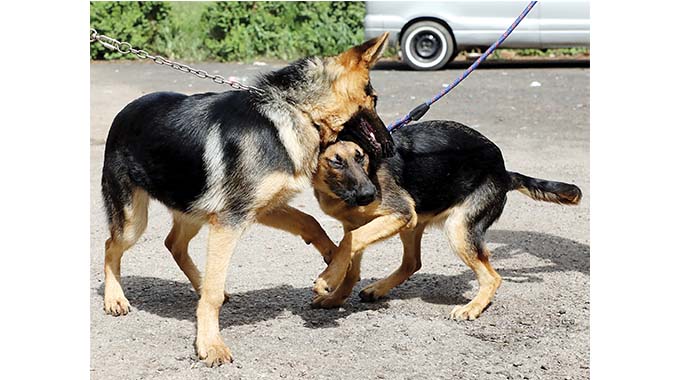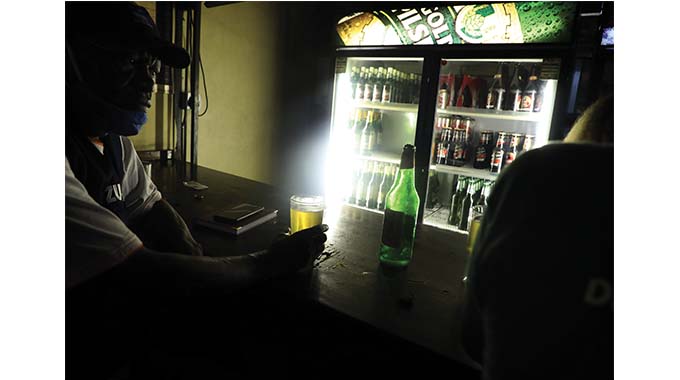The life of canine police officers

Mashudu Netsianda, Senior Reporter
Since time immemorial, dogs have been known to be man’s best friend.
Naturally, human beings fall in love with dogs for different reasons – some are intelligent and protective.
The relationship between man and a dog differs with people opting for different breeds for their varied skills and characteristics.
Police opt for the Labrador Retriever and German Shepherds for their noble character, loyalty, curiosity, high intellect and obedience.
German Shepherds are used for patrols while Labrador Retriever are categorised under detector dogs (DD) used to sniff drugs and explosives among other things.
A police dog is a dog that is specifically trained to assist police and other law-enforcement personnel in their duties.
The duties include searching for drugs and explosives, locating missing people, finding crime scene evidence, dispersing rioters and attacking people targeted by the police.

Chronicle yesterday visited the Zimbabwe Republic Police (ZRP) Bulawayo Provincial Canine Section to have an insight into how the training of dogs is conducted, their behaviour and traits.
The ZRP Canine Section is responsible for breeding and training of police dogs.
The ZRP has 20 police dogs in Bulawayo and the oldest is Patrol Dog (PD) Sisi. She is 10 years old and is about to retire having been in the police service since 2011.
The youngest police dog is a puppy, aged six months, Spider.
Just like their handlers, police dogs have force numbers.
The acting officer-in-charge of ZRP Bulawayo Canine Unit, Assistant Inspector Makhosi Masuku, said it takes 13 weeks for them to train a German Shepherd. For the Labrador Retriever, the duration of the training is at least eight weeks.
The training is done at the ZRP National Dog Training School in Harare.

“The Labrador Retriever is actually good in retrieving and long ago, they were used for hunting. We train them to retrieve drugs and explosives and it takes up to eight weeks. We do continuous training here in Bulawayo so that they don’t forget,” he said.
“German Shepherds are intelligent and capable working dogs, which is why as police we use them for patrols. Their devotion and courage is unmatched and they are amazingly versatile.”
He said a dog gets its initial training upon turning one year after which they begin police duties.
“Usually, dogs are trained at one year as we expect that it would have matured at that age to grasp the required concept in doing police work.
“Breeding is done in Harare and they are then sent to Bulawayo when they are still puppies. We then identify a handler who will be able to socialise with the puppies so that they develop a bond,” he said.
“They are then sent back to Harare for training. For patrols we usually use the German Shepherd because it has been proven that they are very intelligent and easy to train.”
Asst Insp Masuku said their dogs have made remarkable achievements in the fight against crime in Bulawayo.
“When a police dog is introduced to a scent or footprint of the suspect, it can track and, in some cases, we have managed to arrest a number of suspects using our dogs,” he said.
Police dogs played a crucial role in the arrest of eight notorious robbers who terrorised residents of Cowdray Park and Luveve suburbs in Bulawayo, raping women and robbing residents.
The eight men made headlines in 2016 when they were jailed for a combined 629 years.
Two serial copper cables thieves, Pardon Sibanda (35) and Bishop Muleya (33), both of Bellevue suburb, were arrested in May last year after they were caught stealing the cables in Burnside.
They were arrested after police used sniffer dogs to fish them out of a manhole while busy cutting TelOne cables.
One of the suspects appeared in court in May last year and was sentenced to 70 years in jail over the US$20 000 copper theft case.
In terms of food, police dogs eat meat and carbohydrates in the form of 0,25 grammes of dog meal mixed with a kilogramme of meat every day per dog.
Police dogs are also an attraction during national events such as Independence Day and Heroes’ Day celebrations, drawing huge crowds through their displays on such occasions.
During the Zimbabwe International Trade Fair (ZITF), the Zimbabwe Republic Police (ZRP) exhibition stand is undoubtedly a crowd puller, as people, especially children, jostle to watch their performances.
Asst Insp Masuku said police dogs are special in that they have a specialised skill in scent discrimination such that they can collect a number of scents and be able to differentiate and pick the needed ones at any given time.
Police dogs are named by their handlers and for one to qualify to be a handler, they have to be an avid lover of dogs.
“If a dog does its job it will be in a way trying to please its handler.
“We have to show much love to the dogs and in the ZRP Canine Unit we don’t just take any police officer, but those we opt for are those who love dogs,” said Asst Insp Masuku.
When the dogs are due for retirement, there is a board of suitability that sits down to do the assessment.
Those that retire from the police are taken back to the training school in Harare. Those interested in fostering the retired dogs can apply to the Police Commissioner-General for consideration.
Asst Insp Masuku said police dogs are trained to be disciplined so that it becomes easy for the handler to use them in policing.
“They are as good as police officers and we expect them to exhibit a high standard of discipline in the course of duty.
“Over the years, police dogs have proved to be effective in crime prevention and investigation of crime scenes where they are mainly used for tracking, sniffing or searching, crowd control and preventive patrols,” he said. — @mashnets











Comments